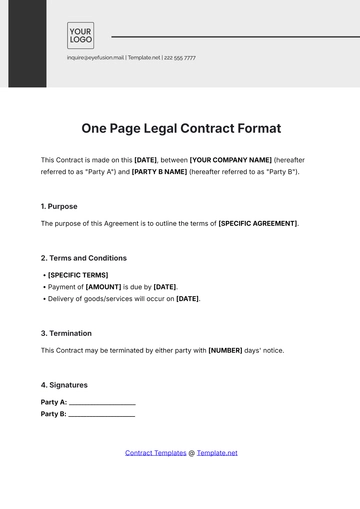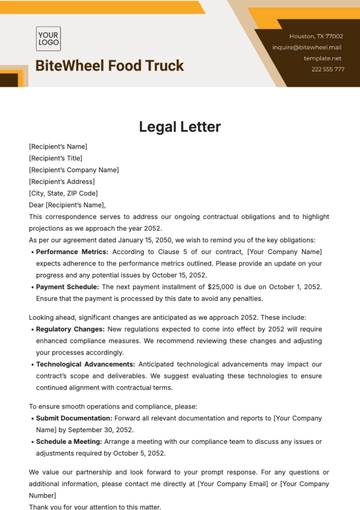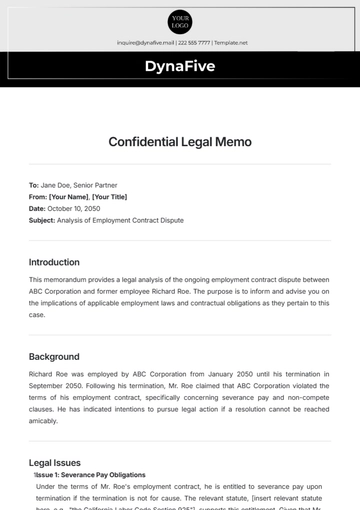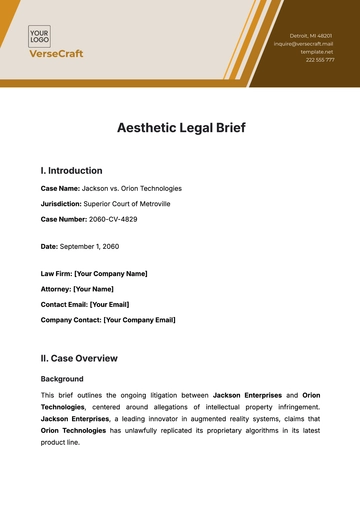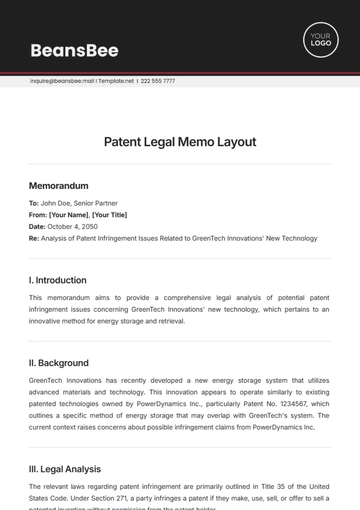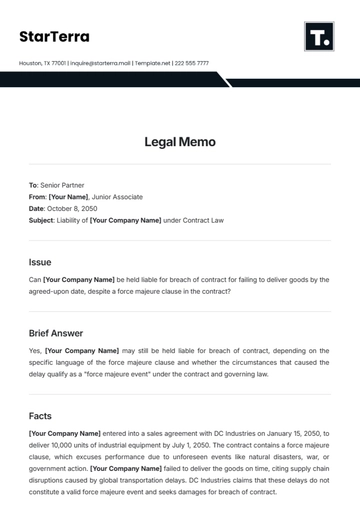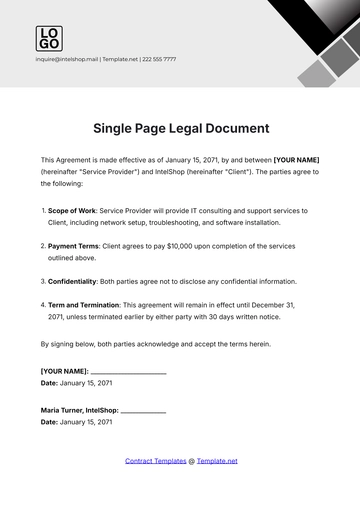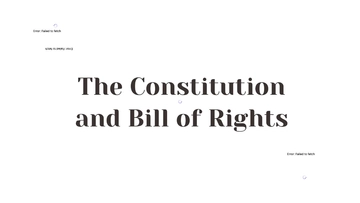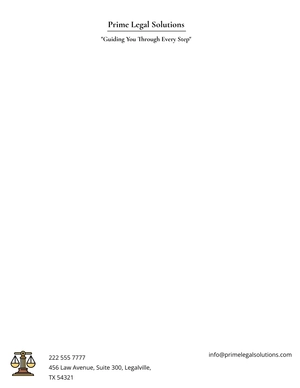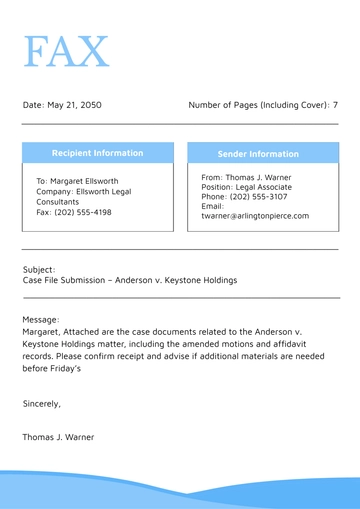Free Legal Case Brief

I. Case Title and Citation
Case Title: Johnson v. Evergreen Corporation
Citation: 460 F.3d 235 (2060)
II. Facts of the Case
Background:
In 2060, Mr. Thomas Johnson, a software developer employed by Evergreen Corporation, brought a lawsuit against Evergreen Corporation for breach of contract and wrongful termination. Johnson claimed that Evergreen Corporation had unlawfully terminated his employment without just cause, violating the terms of his employment contract.
Employment Contract:
Johnson’s employment contract, signed in 2058, stipulated that he could only be terminated for cause, which included severe misconduct, criminal behavior, or gross negligence. Johnson argued that his termination was due to a disagreement over the implementation of a software project, which he believed did not constitute "cause" under the contract.
Evergreen's Defense:
Evergreen Corporation contended that Johnson's refusal to implement certain project specifications amounted to gross negligence and insubordination, justifying his termination under the terms of the contract.
Law Firm Representing Johnson: [Your Company Name]
Law Firm Address: [Your Company Address]
Lawyer: [Your Name]
Lawyer Contact: [Your Email]
III. Procedural History
Initial Filing:
The case was initially filed in the Superior Court of New York in early 2060. Johnson sought damages for lost wages, emotional distress, and breach of contract. Evergreen Corporation filed a motion to dismiss the case, arguing that Johnson's claims were without merit.
Trial Court Decision:
The Superior Court denied the motion to dismiss, finding that Johnson’s claims were sufficiently plausible to proceed to trial. The court emphasized the need to examine the terms of the employment contract and the circumstances surrounding Johnson’s termination.
Appeal:
Evergreen Corporation appealed the Superior Court's decision to the Appellate Court, arguing that the lower court had misinterpreted the contract and that Johnson’s actions constituted gross negligence.
IV. Issue
The central issue in this case is whether Thomas Johnson's actions constituted gross negligence or insubordination under the terms of his employment contract, thereby justifying his termination by Evergreen Corporation.
V. Holding
The Appellate Court held that the Superior Court was correct in allowing the case to proceed to trial. The court found that there were genuine issues of material fact regarding the interpretation of the contract and whether Johnson's actions met the threshold for "cause" under the contract.
VI. Legal Reasoning
Contract Interpretation:
The Appellate Court emphasized the importance of contract interpretation in this case. The court noted that employment contracts, particularly those with "for cause" termination clauses, require a careful analysis of both the language of the contract and the conduct of the parties involved.
Relevant Contractual Provisions and Court Analysis
Provision | Johnson's Argument | Evergreen Corporation's Argument | Court's Analysis |
|---|---|---|---|
Termination for Cause | Johnson’s actions did not constitute cause. | Johnson’s refusal amounted to gross negligence. | The term "cause" needs further interpretation. |
Definition of Gross Negligence | Disagreement over project implementation isn't gross negligence. | Refusal to implement project specs is gross negligence. | The court found ambiguity in the contract's language. |
Insubordination Clause | Not applicable as per the contract’s intent. | Johnson’s actions were insubordinate. | The court questioned the application of insubordination. |
Conclusion:
The Appellate Court concluded that the contract's terms were ambiguous, and therefore, the case should be resolved through a full trial where evidence and testimonies could be evaluated.
VII. Court Decision
The Appellate Court affirmed the Superior Court's decision to deny Evergreen Corporation's motion to dismiss. The case was remanded to the trial court for further proceedings, where a jury would determine whether Johnson's termination was justified under the terms of his employment contract.
VIII. Conclusion
This case highlights the complexities involved in employment contract disputes, especially when dealing with termination clauses and the definition of "cause." The court's decision underscores the importance of clear and precise contract drafting, as well as the need for thorough judicial review when ambiguities arise.
Law Firm Representing Evergreen Corporation:
Mason & Reed LLP
Law Firm Address: 567 Evergreen Blvd., Suite 900, New York, NY 10001
Lawyer: Sarah Mason
Lawyer Contact: sarah.mason@masonreed.com
Date: March 15, 2060
Prepared by: [Your Name]
Contact Information: [Your Email]
- 100% Customizable, free editor
- Access 1 Million+ Templates, photo’s & graphics
- Download or share as a template
- Click and replace photos, graphics, text, backgrounds
- Resize, crop, AI write & more
- Access advanced editor
Discover Legal Case Brief Template, exclusively from Template.net, designed to streamline your legal proceedings. This comprehensive template is fully editable and customizable, allowing you to adapt it to your specific case requirements effortlessly. Seamlessly integrate with our Ai Editor Tool for unparalleled ease of use and precision. Simplify your legal documentation process and enhance your efficiency with this essential resource.

